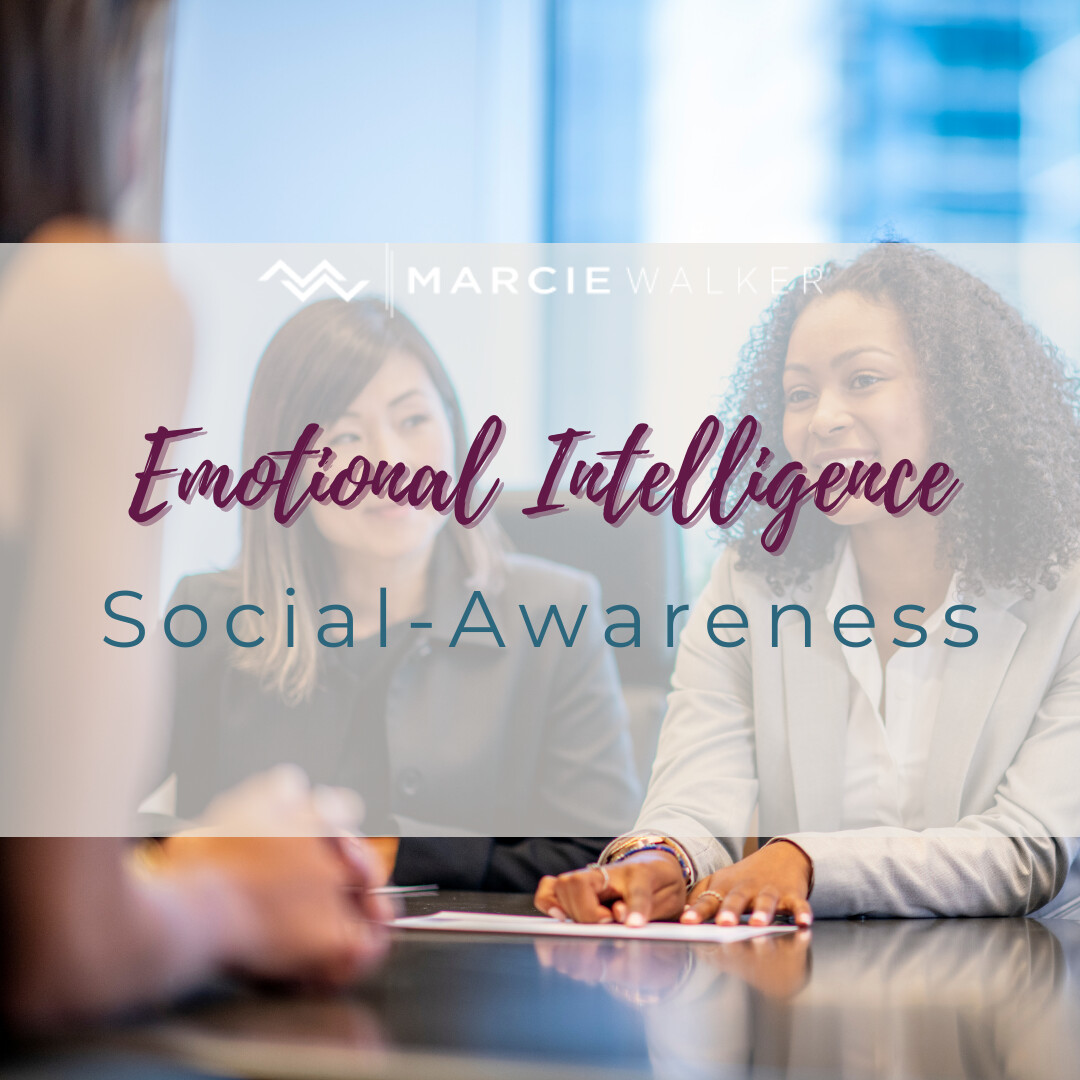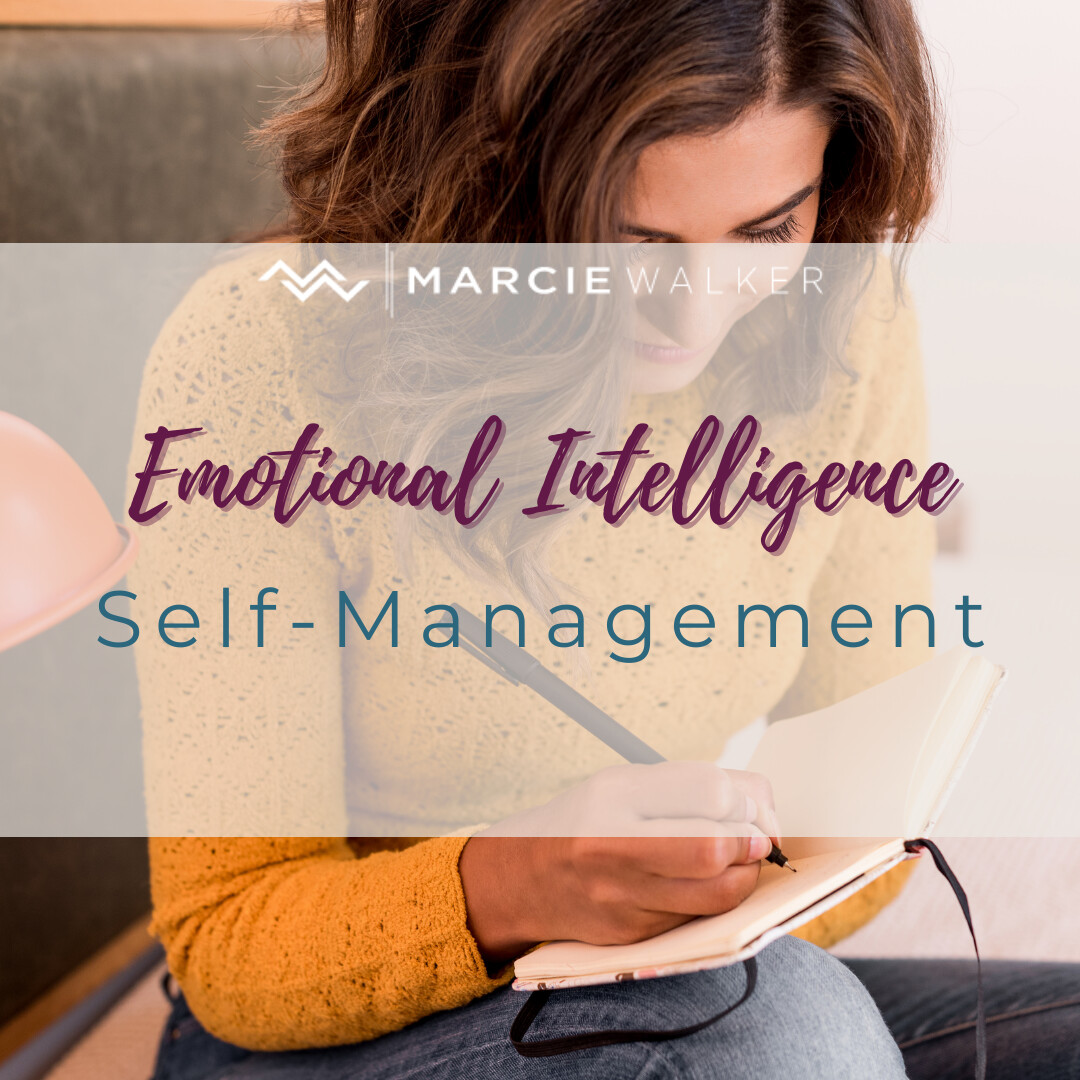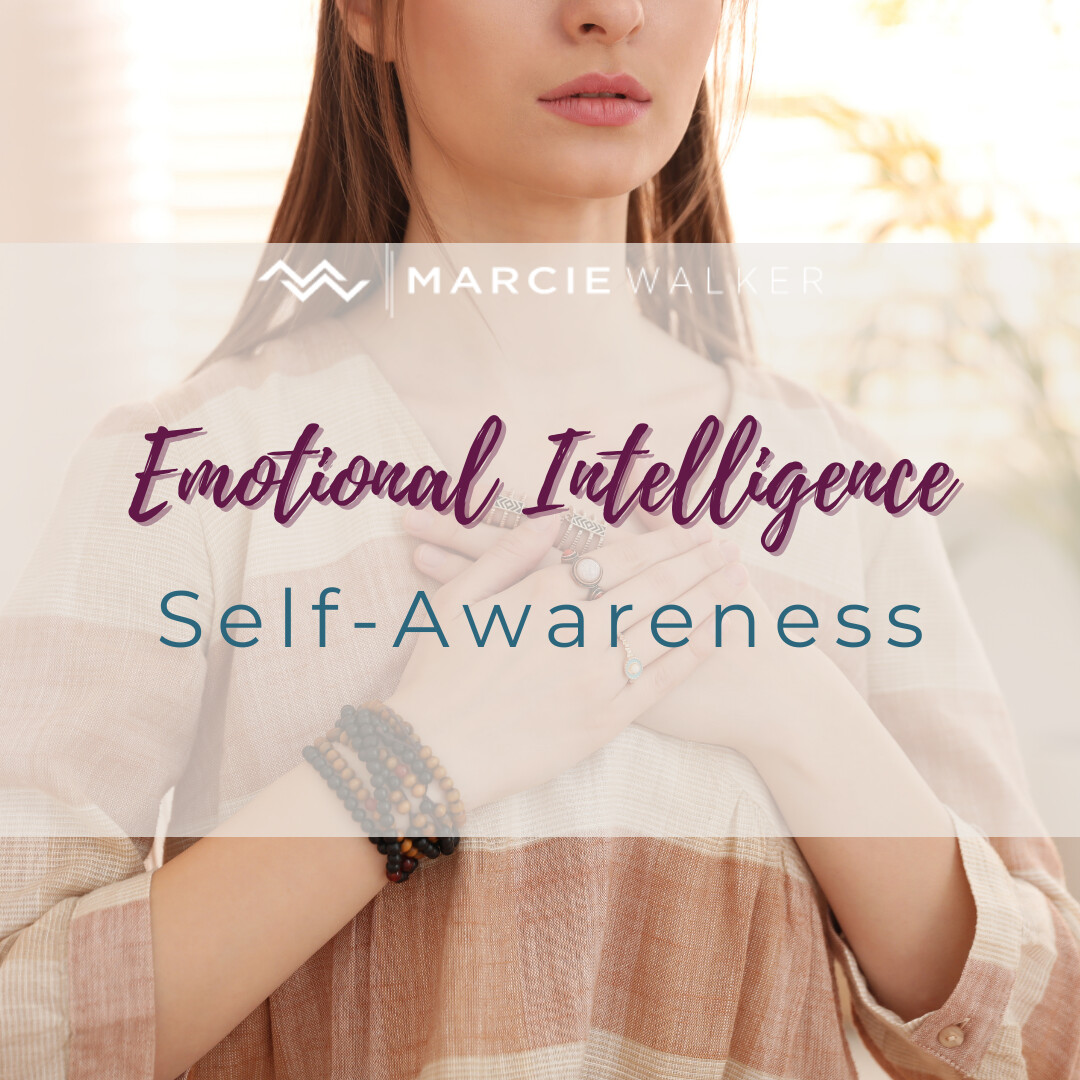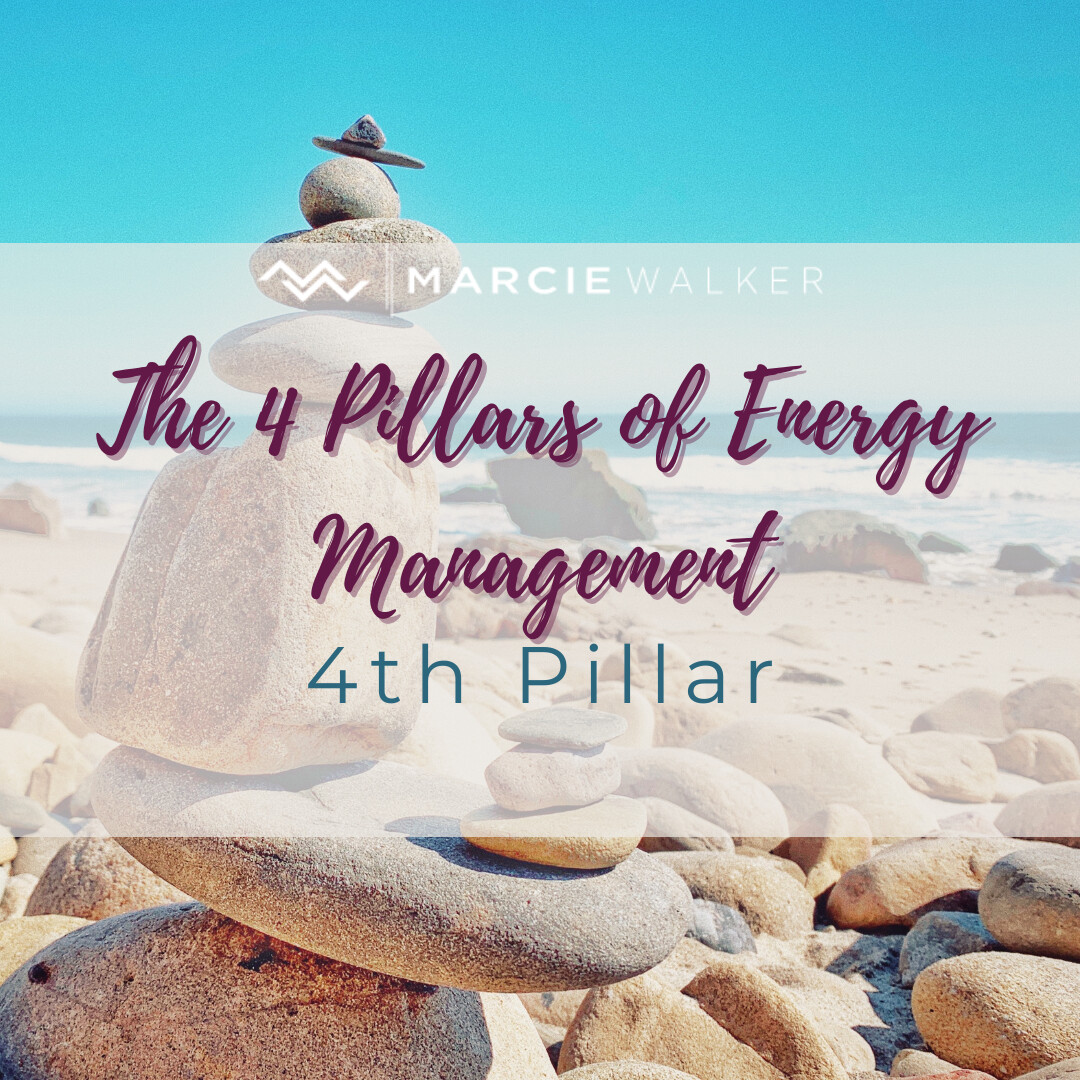
Third Step in Developing Emotional Intelligence: Social-Awareness
By now, you probably understand the first two steps: self-awareness and self-management. The third step in developing emotional intelligence is social awareness. As you continue developing higher emotional intelligence, it is essential that you understand social awareness.
What is social awareness?
Social awareness is the ability to identify and understand the emotions of other people. Great social awareness involves considering the perspectives of others while trying to understand their perspective during interactions.
Leaders must understand the feelings and actions of peers and team members while learning to behave in different situations.
When practicing social awareness, leaders need to:
- Listen to what others have to say while eliminating preexisting biases.
- Avoid anticipating the answers of others before they speak.
- Listen carefully before responding to a question or request.
The role of social awareness in the workplace
According to Forbes, the three core aspects of social awareness are empathy, organizational awareness, and service orientation.
Empathy
Empathy is the ability to understand and share the feelings of others emotionally. The actions people take are based on emotions. An empathic leader effectively addresses any issues among teams and other peers by understanding how they feel in any given situation.
Organizational awareness
Organizational awareness is the understanding of a workplace and its culture. A leader with social awareness knows the mission and vision of their organization and understands the contributions of each employee. An organizational level of awareness helps you make the right decisions to maximize rewards and avoid trouble.
Service orientation
Service orientation refers to the understanding of clients and their needs. As a leader, you need to be able to understand the best way to give people what they need.
How to improve social awareness
A leader with great social awareness is present in every interaction with keen listening and observational skills. Listening is the key to understanding facts free of judgment and analyzing the emotions of other people. By truly listening, you can discover how you can help your team and organization succeed.
Three ways to improve social awareness
- Look for visual cues. Observing and analyzing visual cues requires you to be present in the conversation. Actively listening while analyzing facial expressions and body language gives the most profound understanding of any social situation.
- Be aware of tone. Tone is the best indicator when speaking on the phone or meeting virtually. Sensing tone will tell you how someone truly feels when they may be conveying the opposite.
- Read the room. Mastering social awareness by sensing the energy of everyone in an environment. What is going on between employees? Is there tension that needs to be resolved? How can you help?
Move forward with better social awareness
You cannot be a successful leader if you do not have social awareness. Social awareness helps you build trust with your team and gives you a better understanding of how your employees feel and react. Contact me for more information on how I can help you reach your organizational goals through better social awareness.

Second Step in Developing Emotional Intelligence: Self-Management
To be a successful manager, you need to have a good understanding of emotional intelligence, how well developed your own EI, is and how to use it to achieve your objectives. I previously discussed self-awareness is the first step in developing emotional intelligence. The second step in developing emotional intelligence is self-management.
What is self-management?
Self-management is our ability to manage our actions, behaviors, thoughts, and emotions productively. The self-management facet of emotional intelligence builds based on self-awareness and is simply the ability to control your emotions so that they don’t control you.
Self-management involves using what you know about your emotions to manage them in such a way as to generate positive interactions with others and motivate yourself in all situations. People with strong self-management skills know what to do and how to act in different situations.
Self-management skills extend beyond the workplace into personal life. Self-management means you understand your responsibility in different aspects of your life, and you do what you need to fulfill that responsibility. The very act of acknowledging the fact that you are feeling a negative emotion goes a long way to preventing you from losing control of your behavior.
The role of self-management in the workplace
According to Indeed, self-management skills “allow you to maximize your productivity, improve your workplace performance and efficiently achieve professional goals.”
Self-management is an essential part of a functional organization and a skill for everyone, not just leaders in positions of power. In “12 Rules for Self-Management,” Rosa Say wrote, “Management is not just for managers, just as leadership is not only for leaders. We all manage, and we all lead.” Say argues an organization where “everyone lives and works by self-managing” is a “business destined for greatness.”
The role of leaders and managers is to empower team members across their organization to self-manage. Effective self-management allows employees to make good decisions by being more innovative and resourceful. When individual team members understand their responsibilities and goals, they can make better decisions that positively impact the rest of the team and organization.
How to improve self-management skills
Someone with poor self-management may stay up late when they need to wake up early, procrastinate when they have a deadline, and become irritated when a project doesn’t go their way. However, you don’t need to meet any warning signs to decide if you need to improve your self-management. Like all other aspects of emotional intelligence, self-management skills can be improved, refined, and mastered.
Five ways to improve your self-management skills
- Know your values. When you identify your values and make choices that align with them, it’s easier to make decisions. Speak up for what you believe in and be willing to stand up for it. When your values are clear and defined, it helps others understand you and how you behave.
- Build trust. Start to build trust with others by being honest and keeping your promises. Building trust will help others believe what you say and confide in you. Be willing to trust others, and they will return the favor.
- Accept accountability. As your responsibilities increase, your level of accountability increases as well. When faced with negative results, don’t be a victim or a martyr. Instead, accept accountability and look towards the future with enthusiasm and newfound wisdom.
- Have a good work ethic. Having a good work ethic can be as simple as always being polite, professional, and on time. Lead by example and set the tone for all aspects of life by showing others you care.
- Take care of your body and mind. Eating healthy foods, getting enough sleep, and staying active are the foundation of self-care. My integrative health and wellness program is designed to evaluate all factors that influence health, wellness, and disease processes by focusing on the body, mind, spirit, and community.
Improve your self-management skills with an experienced expert
Self-management is an essential skill in our personal and professional lives that can be continuously refined and improved. Together we can determine in what ways you excel at self-management and where you might need to improve. Contact me to learn how I can help you improve your self-management skills.

First Step in Developing Emotional Intelligence: Self-Awareness
As the founder of Marcie Walker LLC, I help my clients focus on holistic wellness through brain-based coaching to improve their emotional intelligence. Emotional intelligence helps us build fantastic relationships in our personal lives and careers by utilizing the powers of self-awareness, self-management, social awareness, and relationship management. Emotional intelligence means being self-aware, managing yourself well, reading others’ emotions, and connecting with others. The first step in developing emotional intelligence is self-awareness.
What is self-awareness?
Self-awareness is the ability to see oneself clearly and objectively through reflection and introspection. It involves being aware of different aspects of the self, including traits, behaviors, and feelings. Self-awareness is the basis for a theory that states, “you are not your thoughts, but the entity observing your thoughts.” As the thinker and you’re separate from your thoughts.
Three benefits of self-awareness
Self-awareness is not just the basis for a psychological theory or a management buzzword. It’s the key to creating sustainable positive life changes and better performance in the workplace as a leader. Research published on self-awareness and constructive functioning has found self-awareness enables “self-control, creative accomplishments, and high self-esteem.”
Self-awareness improves self-control
Self-aware people are the first to take responsibility for their actions. They understand the expected social norms in both their personal and professional lives. With self-awareness, we’re less likely to lie, cheat, and steal.
Self-awareness increases creative achievements
Self-awareness enables creative achievements, but how it does so is not clear. The theory is most highly creative people go through a process involving a significant amount of self-awareness. To achieve the best outcome, creative people deeply reflect on their work and incorporate adjustments and improvements. Thus, high self-awareness stimulates creativity.
The link between self-awareness and higher self-esteem
Increased self-awareness can lead to higher self-esteem and a sense of pride. The key is to see oneself as the cause of success. Seeing yourself as the cause of success leads to positive feelings of pride, which is the basis of self-esteem.
The role of self-awareness in the workplace
Dr. Tasha Eurich wrote in the Harvard Business Review that there are two types of self-awareness: internal and external. Internal self-awareness is about how well we see ourselves and our aspirations, strengths, weaknesses, passions, reactions, and fit in an environment. External self-awareness is understanding how others view us with those same factors.
The best leaders and managers need to have a good grasp of both internal and external self-awareness. While many people think they are self-aware, true self-awareness is a rare skill. Research shows less than 15 percent of those in Eurich’s (2018) study displayed self-awareness. However, it is possible to improve self-awareness.
How to increase self-awareness
I help clients take control of their lives by providing practical tools to improve their self-awareness. My holistic approach attunes your body and mind for success through guided meditation, goal setting, and powerful coaching.
Three ways to increase self-awareness include:
- active listening
- asking “what” questions
- mindful meditation
Active listening
Listening in a way where you are engaged with your conversation partner in a positive way is also known as active listening. Active listening involves truly listening without judgment or evaluation. It’s essential to observe the emotions and body language of both you and your conversation partner.
Ask what, not why
Asking yourself “what” questions increases productive introspection while decreasing unproductive rumination associated with “why” questions. “What” questions help you stay objective and focused on the future. For example, when trying to understand your feelings instead of asking yourself, “Why do I feel this way?” Ask yourself, “What factors make me feel this way, and what do they have in common?”
Mindful meditation
Mindful meditation leads to better self-awareness. Mindful meditation involves paying attention to the things that are often ignored in our busy day-to-day lives. Through guided meditation, I can help you improve your self-awareness.
Become a more self-aware leader
Self-awareness is a rare skill, and it’s not easy to master. You can become a better leader who makes sounder decisions, builds stronger relationships, and communicates more effectively through proper guidance. As a more effective leader, you’ll have more satisfied employees and more profitable companies. Contact me to become a more self-aware leader.

The Four Pillars of Energy Management to Help you with Stress, Resilience, Overwhelm, and Burnout
Pillar 4: Environmental Health and Wellbeing
The last of the Four Pillars of Energy Management deals with environmental health and wellbeing. Environmental wellbeing encompasses all of our surroundings, from our workspace to the company we keep.
The negative impact of visual clutter
Visual clutter can influence mental clutter and make it hard to focus. Disorganization and clutter have a cumulative effect on our brains. Our brains like order, so constant visual reminders of disorganization reduce our ability to focus. The visual distraction of clutter increases cognitive overload and can reduce our working memory.
The influence of the company you keep
Our interpersonal relationships greatly influence us. Those around us influence our decisions, self-esteem, and the way we think.
Everyone is their own person, but we’re more affected by our environment than we think. It’s ideal to be closely surrounded by positive, supportive people who want you to succeed. Understanding the influence of others on your performance is critical to your success.
To start instituting this pillar into your own life, I suggest taking these initial steps:
All these beliefs are what’s holding you back. At birth, we come into this world with no beliefs at all! As we grow, it is our family, teachers, & environment that bombards us with the beliefs that stick with us through the years.
What are some of the learned behaviors that no longer serve you?
What are some of the limiting beliefs that are holding you back & keeping you playing small?
If you don’t know you can ask yourself the following questions:
- What is your most consistent thought about yourself?
- What is your most consistent thought about your body?
- What is your most consistent thought about your health?
- What is your most consistent thought about money?
If you notice resistance, there’s a good indication that you may need to dig a little deeper in one of those areas.
Create sustainable life changes with the Four Pillars of Energy Management
Ultimately, the Four Pillars of Energy Management can help you become more resilient and reduce stress by improving your physical, mental, emotional, and environmental wellbeing. If you are having trouble balancing any of these, you aren’t alone. We all need help. If you don’t reach out to me, please get support somewhere. You can take control of your life by using practical tools to relieve stress, stop suffering, and find solutions.
Want to know your Energy Management Score?

The Four Pillars of Energy Management to Help you with Stress, Resilience, Overwhelm, and Burnout
Pillar 3: Emotional Health & Wellbeing
The third of the Four Pillars of Energy Management deals with emotional health and wellbeing. The focus of this pillar lies in emotions and sensations.
Defining emotions and sensations
According to the American Psychological Association, emotions are the “complex reaction patterns, involving experiential, behavioral, and physiological elements, by which individual attempts to deal with a personally significant matter or event.”
Sensations are the impulses that your nervous system translates and transmits to your brain that relay information about stress. Sensations are signals between your mind and environment and are the only way you can experience anything physical. Signals could include:
- Images
- Pressure changes
- Smells
- Touches
The role of emotional intelligence
Emotional intelligence is the capacity to be aware of, control, and express one’s emotions. Responding to change requires us to be aware of our emotional response to changes.
To start instituting this pillar into your own life, I suggest taking these initial steps:
- Gain the ability to reduce negative emotions by avoiding jumping to a negative conclusion right away.
- Try to remain calm during times of stress when under pressure, and the most important thing to keep in mind is to keep your cool.
- Start being assertive and express difficult emotions when necessary as it’s important to set your boundaries appropriately, so people know where you stand.
- Gain the ability to stay proactive, not reactive during times of stress or when you feel frustrated with someone.
- Start expressing intimate emotions in close, personal relationships.
Check-in for my fourth blog when we’ll learn more about the fourth pillar, Environmental Health, and Wellbeing.
Want to know your Energy Management Score?















